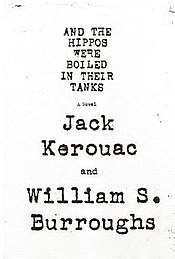
Jean-Louis Lebris de Kérouac, known as Jack Kerouac, was an American novelist and poet who, alongside William S. Burroughs and Allen Ginsberg, was a pioneer of the Beat Generation.

William Seward Burroughs II was an American writer and visual artist. He is widely considered a primary figure of the Beat Generation and a major postmodern author who influenced popular culture and literature. Burroughs wrote eighteen novels and novellas, six collections of short stories and four collections of essays, and five books have been published of his interviews and correspondences; he was initially briefly known by the pen name William Lee. He also collaborated on projects and recordings with numerous performers and musicians, made many appearances in films, and created and exhibited thousands of visual artworks, including his celebrated "Shotgun Art".

The Beat Generation was a literary subculture movement started by a group of authors whose work explored and influenced American culture and politics in the post-World War II era. The bulk of their work was published and popularized by Silent Generationers in the 1950s, better known as Beatniks. The central elements of Beat culture are the rejection of standard narrative values, making a spiritual quest, the exploration of American and Eastern religions, the rejection of economic materialism, explicit portrayals of the human condition, experimentation with psychedelic drugs, and sexual liberation and exploration.
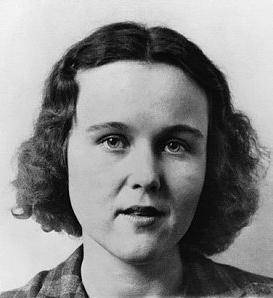
Joan Vollmer was an influential participant in the early Beat Generation circle. While a student at Barnard College, she became the roommate of Edie Parker. Their apartment became a gathering place for the Beats during the 1940s, where Vollmer was often at the center of marathon, all-night discussions. In 1946, she began a relationship with William S. Burroughs, later becoming his common-law wife. In 1951, Burroughs killed Vollmer. He claimed, and shortly thereafter denied, the killing was a drunken attempt at playing William Tell.

The Subterraneans is a 1958 novella by Beat Generation author Jack Kerouac. It is a semi-fictional account of his short romance with Alene Lee (1931–1991), an African-American woman, in Greenwich Village, New York. It was the first work of Kerouac’s to be released following the success of On the Road. The Subterraneans and its following novel,The Dharma Bums, both proved to be popular when released in 1958, and are now seen as important works of the Beat Literature. A Hollywood film adaptation would be released in 1960.
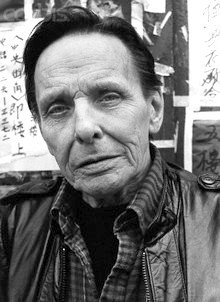
Herbert Edwin Huncke was an American writer and poet, and an active participant in a number of emerging cultural, social and aesthetic movements of the 20th century in America. He was a member of the Beat Generation and is reputed to have coined the term.

Junkie: Confessions of an Unredeemed Drug Addict, or Junky, is a 1953 novel by American Beat generation writer William S. Burroughs. The book follows "William Lee" as he struggles with his addiction to morphine and heroin. Burroughs based the story on his own experiences with drugs, and he published it under the pen name William Lee. Some critics view the character William Lee as simply Burroughs himself; in this reading, Junkie is a largely-autobiographical memoir. Others view Lee as a fictional character based on the author.
James Grauerholz is a writer and editor. He is the bibliographer and literary executor of the estate of William S. Burroughs.
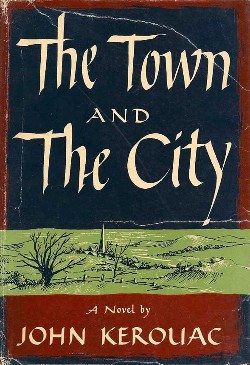
The Town and the City is a novel by Jack Kerouac, published by Harcourt Brace in 1950. This was the first major work published by Kerouac, who later became famous for his second novel On the Road (1957). Like all of Jack Kerouac's major works, The Town and the City is essentially an autobiographical novel, though less directly so than most of his other works. The Town and the City was written in a conventional manner over a period of years, and much more novelistic license was taken with this work than after Kerouac's adoption of quickly written "spontaneous prose". The Town and the City was written before Kerouac had developed his own style, and it is heavily influenced by Thomas Wolfe.
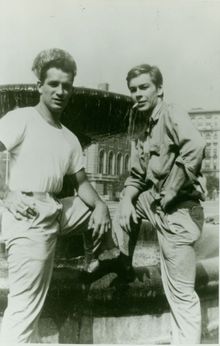
Lucien Carr was a key member of the original New York City circle of the Beat Generation in the 1940s and also a convicted manslaughterer. He later worked for many years as an editor for United Press International.
Edie Kerouac-Parker was the author of the memoir You'll Be Okay, about her life with her first husband, Jack Kerouac, and the early days of the Beat Generation. While an art student under George Grosz at Barnard College, she and fellow Barnard student and friend Joan Vollmer shared an apartment on 118th Street in New York City which came to be frequented by many of the then unknown Beats, among them Vollmer's eventual husband William S. Burroughs, and fellow Columbia students Jack Kerouac and Allen Ginsberg as well as Lucien Carr.

Desolation Angels is a semi-autobiographical novel written by Beat Generation author Jack Kerouac, which makes up part of his Duluoz Legend. It was published in 1965, but was written years earlier, around the time On the Road was in the process of publication. The events described in the novel take place from 1956-1957. Much of the psychological struggle which the novel's protagonist, Jack Duluoz, undergoes in the novel reflects Kerouac's own increasing disenchantment with the Buddhist philosophy. Throughout the novel, Kerouac discusses his disenchantment with fame, and complicated feelings towards the Beat Generation. He also discusses his relationship with his mother and his friends such as Allen Ginsberg, Neal Cassady, Lucienn Carr and William S. Burroughs. The novel is also notable for being a relatively positive portrayal of homosexuality and homosexual characters, despite its use of words that were at the time considered homophobic slurs.
Grove Press is an American publishing imprint that was founded in 1947. Imprints include: Black Cat, Evergreen, Venus Library, and Zebra. Barney Rosset purchased the company in 1951 and turned it into an alternative book press in the United States. He partnered with Richard Seaver to bring French literature to the United States. The Atlantic Monthly Press, under the aegis of its publisher, Morgan Entrekin, merged with Grove Press in 1993. Grove later became an imprint of the publisher Grove/Atlantic, Inc.
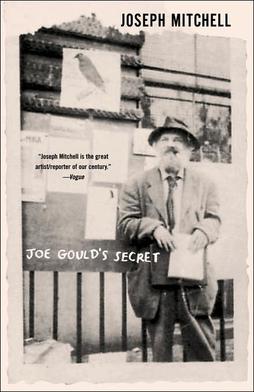
Joe Gould's Secret is a 1965 book by Joseph Mitchell, based upon his two New Yorker profiles, "Professor Sea Gull" (1942) and "Joe Gould's Secret" (1964). Mitchell's work details the true story of the eponymous Joe Gould, a writer who lived in Greenwich Village in the first half of the 20th century. Gould was an eccentric, bridging the gap between bohemianism and the beat generation, though he was an outspoken critic of both. This criticism alienated him from the social circles of poets, authors, and artists of his time, and instead he focused on documenting the history of what he called the "shirt-sleeved multitude."

Beat is a 2000 American biographical drama film written and directed by Gary Walkow, and starring Courtney Love, Kiefer Sutherland, Norman Reedus, and Ron Livingston. The film focuses primarily on the last several weeks of writer Joan Vollmer's life in 1951 Mexico City, leading up to her accidental killing by her husband, the writer William S. Burroughs. It premiered at the Sundance Film Festival in January 2000 and was entered into the 22nd Moscow International Film Festival.
Jack Kerouac was an American novelist and poet. He is considered a literary iconoclast and, alongside William S. Burroughs and Allen Ginsberg, a pioneer of the Beat Generation. Kerouac is recognized for his method of spontaneous prose. Thematically, his work covers topics such as Catholic spirituality, jazz, promiscuity, Buddhism, drugs, poverty, and travel. Kerouac used the name "Duluoz Legend" to refer to his collected autobiographical works.
This is a bibliography of the works of William S. Burroughs.
Ira Silverberg is an American editor and consultant to writers, artists, publishers, funders, and non-profit arts organizations. He is a member of the adjunct faculty of the Columbia University School of the Arts, MFA Writing Program.

Call Me Burroughs is a spoken word album by Beat Generation author William S. Burroughs, which was released on LP by The English Bookshop, Paris, in June 1965, and then issued in the United States by ESP-Disk, New York, in 1966. Rhino Word Beat reissued the album on Compact Disc in 1995, the company's first ever reissue.
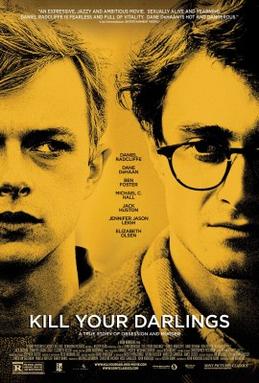
Kill Your Darlings is a 2013 American biographical drama film written by Austin Bunn and directed by John Krokidas in his feature film directorial debut. The film had its world premiere at the 2013 Sundance Film Festival, garnering positive first reactions. It was shown at the 2013 Toronto International Film Festival, and it had a limited theatrical North American release from October 16, 2013. Kill Your Darlings became available on Blu-ray and DVD in the US on March 18, 2014, and then in the UK on April 21, 2014.
